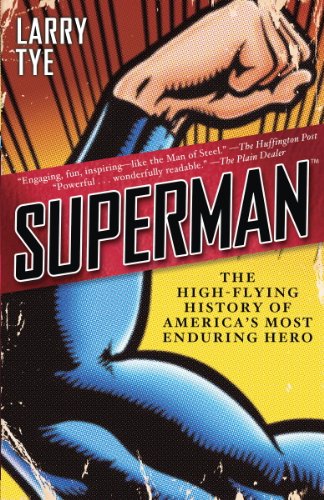
![]() Superman: The High-Flying History of America’s Most Enduring Hero by Larry Tye
Superman: The High-Flying History of America’s Most Enduring Hero by Larry Tye
It’s hard to imagine that there is anything more to say about Superman than has already been covered in the slew of books published on the topic. But, since I’ve not read many of those books (though I have read a lot dealing with superheroes in general), I’m not the one to say how much new material Larry Tye covers in his retrospective entitled Superman: The High-Flying History of America’s Most Enduring Hero (2012). But for someone like me, without an encyclopedic knowledge of Superman beyond simple cultural experience and the aforementioned superhero books, I can say that this book does a great job of following the Man of Steel from creation to his “death,” then on to his resurrection and into the current decade, including lengthy discussions of his media appearances beyond the comic book world.
The book mostly moves in strict chronological order, though there is some weaving back and forth as Tye follows one track, say the TV shows Smallville or Lois and Clark through to their closing, then needs to cycle back to where he’d picked up with the shows to see what was going on in the print or film media at that time. Sometimes these back-and-forths were a little jarring, but not too often and it never took long to reorient oneself in the correct time.
One storyline that runs throughout the entire work is the long-running battle between Superman’s creators — Joe Shuster and Jerry Siegel — and Superman’s corporate owners over appropriate payment. (The battle continues with their heirs.) I’d always had the impression that they had been mistreated, but Tye offers up what seems to be a well-balanced history that puts things in less of an emotional context and shows both sides pretty fairly. Some might wish for less of the legal wrangling or fewer monetary details, but I found it to be an interesting morality tale as well as a historically informative one.
There were several other surprises beyond the more balanced treatment of the rights issue. I wasn’t aware, for example, that kryptonite, which I’d always believed sprang wholly out of the radio show, had a precursor in a 1940 idea for K-Metal that never was published. There were more than enough of those new facts, along with the fill-in-the-details-of-what-I-generally-knew information, to keep me engaged throughout the text.
I thoroughly enjoyed, for instance, the details of the constraints Joe Shuster began operating under once he and Siegel had bosses: “His [Superman’s] forelocks couldn’t be too curly, his arms should be shorter and less ‘ape-like,’ and Joe should get rid of his hero’s ‘nice fat bottom.’ The latter especially made Superman look too ‘lah-de-dah.’” And I was shocked by the cavalier way the bosses complained about Lois Lane’s plumpness: “Murray suggest that you arrange for her to have an abortion or the baby and get it over with so that her figure can return to something a little more like the tasty dish she is supposed to be.”
Another welcome bit of freshness is the extended look at the non-print aspects. Tye moves through the various radio shows, cartoons, movie serials, full-length movies, and television shows with an appropriate level of detail, taking us right up to the last film release and a bit of information (not much) on the planned 2013 movie. This was the aspect of the history I was least familiar with and I appreciated the time Tye took in running through the way the various media versions developed, changed over time, then eventually died out, usually to be quickly replaced by the next form, as when TV killed off the radio and movie serials. There is simply so much material that one can’t be encyclopedic (one could write an entire book simply on the George Reeves TV show), but I didn’t feel shortchanged with regard to any of these elements save one: the video/computer game world. As this is such a big business nowadays, I would have expected some larger mention of Superman’s infiltration (or not) of this media.
As I’ve found is often the case in these sorts of cultural histories, the language sometimes goes a bit far, or various aspects feel somewhat exaggerated. Some examples here are Superman’s popularity through various decades (especially as this was at times directly contradicted when one of the quoted figures would say how they took this or that job despite knowing “nothing” about Superman), the religious overtones, various connections to 9/11, and so on. Not to say the core of what he’s saying isn’t correct, just that at times the language felt a bit un-cautious, so to speak.
That said, the book is clearly well researched, with quotes from interviews, court documents, personal letters, memoirs, etc. sprinkled liberally throughout the text; the book never feels anything but substantive. The prose is smooth and effortless from start to finish, more than pedestrian but never drawing attention to itself or distracting from the information. It feels thoroughly researched but doesn’t read like a research paper, nor does it employ that false breezy kind of dumbed-down voice I so hate in some pop culture works.
In the end, Superman was not simply informative, but also highly enjoyable to read from beginning to end. I’d certainly recommend it and would look forward to a similar treatment by Tye of any other superhero.



I felt just the same. The prose and character work was excellent. The larger story was unsatisfying, especially compared to…
Hmmm. I think I'll pass.
COMMENT Was I hinting that? I wasn't aware of it. But now that you mention it.... 🤔
So it sounds like you're hinting Fox may have had three or so different incomplete stories that he stitched together,…
It's hardly a private conversation, Becky. You're welcome to add your 2 cents anytime!